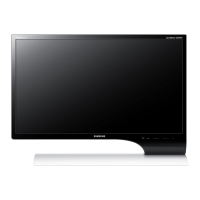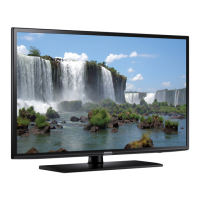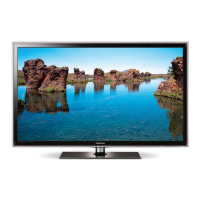
Do you have a question about the Samsung LED TV MONITOR and is the answer not in the manual?
Avoid displaying still images like jpeg picture files, channel logos, or stock bars to prevent image burn-in.
Icons used for safety precautions and warnings related to power.
Warnings and precautions related to product installation to prevent hazards.
Precautions and guidelines for cleaning the product safely.
Guidelines for safe product usage, including handling power and avoiding disassembly.
Maintain at least 4 inches distance for proper ventilation to prevent overheating and fire.
Overview of key features like SMART HUB, AllShare Play, and Anynet+ (HDMI-CEC).
Lists included accessories and cables with the product.
Explanation of the product's control panel buttons and their functions.
Detailed description of each button on the standard remote control.
Guide on navigating product menus using the remote control.
Instructions for connecting the power cord and aerial or cable.
Step-by-step guide for initial setup of basic product settings.
Guide to connecting AV devices using HDMI and other cables.
Instructions for connecting component or A/V cables for video and audio.
Guide for connecting audio devices using optical and headphone cables.
Information on the service connection port for maintenance purposes.
Instructions for connecting a PC using HDMI, DVI, or D-sub cables.
How to switch between different input sources like TV, PC, HDMI, AV, etc.
Steps to connect wirelessly to a laptop using Intel WiDi.
Guidelines for maintaining proper posture while using the monitor for comfort.
Explanation of preset picture modes like Standard and Entertain.
How to adjust backlight, contrast, brightness, and sharpness for picture quality.
Options for adjusting picture size and aspect ratio, including 16:9 and 4:3.
Adjusting auto-settings and PC screen settings for optimal display.
Advanced settings for color tone, white balance, and gamma.
Explanation of preset sound modes like Standard, Music, and Movie.
Guide to adjusting sound effects, equalizer, and SPDIF output settings.
How to use the INFO button for program information and channel viewing.
Guide to accessing and using the channel menu for EPG and channel management.
Managing channels: adding, deleting, setting favorites, and viewing lists.
Functions within the Tools menu for channel management like editing favorites.
Setting up schedules for automatic channel display and recording.
Viewing channel lists, program information, and managing schedules.
How to set up country and perform auto tuning for channel memorization.
Manually scanning and storing channels for digital and analogue reception.
Features like guide type, channel list transfer, and fine tuning.
Selecting preset picture modes like Dynamic, Standard, Natural, and Movie.
Detailed adjustment of picture settings including backlight, contrast, colour, and tint.
Options for adjusting picture size and zoom, including Auto Wide and Screen Fit.
Advanced picture settings like dynamic contrast, black tone, and RGB only mode.
Selecting preset sound modes like Standard, Music, Movie, Clear Voice, and Amplify.
Adjusting sound effects, equalizer, and SPDIF output for optimal audio.
Settings for audio language, format, and audio description.
Ways to connect the product to a network using cable.
Information on connecting to a network via a wireless router or modem.
Steps for automatic and manual setup of a wired network connection.
Detailed steps for manually configuring wired network connection with static IP.
Checking the current network and internet status, and troubleshooting connection issues.
Steps for automatic setup of a wireless network connection.
Detailed steps for manually configuring wireless network connection with static IP.
Easy wireless setup using the WPS(PBC) button on the router.
Managing network devices, including Wi-Fi Direct connections.
Setting up Soft AP for connecting mobile devices without a router.
Managing connected devices for AllShare, allowing or denying access.
Setting the product's clock, sleep timer, and time zone.
Setting timers to automatically turn the product on with specific sources.
Setting timers to automatically turn the product off.
Features for reducing power consumption like Energy Saving and Auto Power Off.
Security features like channel lock and programme rating lock.
Using the PIP function to watch multiple video sources simultaneously.
Connecting and using USB or Bluetooth keyboards and mice with the product.
Settings for language, teletext, and subtitle display.
General settings including power saving, game mode, BD Wise, and panel lock.
Controlling connected Samsung devices that support Anynet+ with the TV remote.
Accessing self-diagnosis tools like picture and sound tests.
Information on upgrading product software via USB, online, or channel.
Accessing internet content, applications, and multimedia via Smart Hub.
Using on-screen keypads and connected keyboards for input.
Steps to create a Samsung account for exclusive Smart Hub configuration.
Logging into Samsung account, changing wallpaper, and managing accounts.
Tools for managing applications and folders within Smart Hub.
Creating and naming new folders for organizing applications.
Locking applications in Smart Hub to prevent unauthorized access.
Unlocking applications in Smart Hub using the security PIN.
Accessing settings for account management, service management, and resets.
Managing services like Auto Ticker and Push Notification settings.
Resetting Smart Hub to factory defaults, erasing user accounts and settings.
Browsing and managing applications available on Samsung Apps store.
Exploring applications categorized by popularity, videos, games, lifestyle, etc.
Searching for content and applications from various sources.
Getting video recommendations and searching for movies from providers.
Sharing photos, messages, and events with family members.
Uploading pictures from USB to create albums for sharing with group members.
Adding memos or events to pictures within Family Story.
Creating records of events with pictures for group viewing.
Tracking and managing fitness and exercise programs.
Accessing kids' applications and content, with management tools.
Surfing the internet using the product's web browser.
Using browser controls like back, forward, refresh, zoom, and bookmarks.
Viewing and playing media files from USB, PC, or DLNA devices.
Recording and playing back broadcast programs using USB HDD.
Using the Timeshift function to pause and rewind live broadcasts.
Playing media content from DLNA connected devices via network.
Connecting and enjoying mobile device content via MHL.
Controlling connected Samsung devices via HDMI-CEC with the TV remote.
Solutions for common issues like flickering, color problems, and powering off.
Troubleshooting PC connection issues, including resolution and audio problems.
Addressing picture distortion caused by compression or weak signals.
Troubleshooting WiDi connection issues, screen scrambling, and driver updates.
List of supported subtitle and AllShare Play file formats.
List of supported music file formats and their codecs.
Details on supported video codecs, resolutions, and bit rates.
Guide to using the Teletext feature for analogue channels.
Instructions on how to adjust the product's tilt angle for better viewing.
Instructions on how to physically secure the product using a Kensington Lock.
Guidelines for storing and maintaining the product to prevent damage.
Information regarding software licenses and trademarks.
Technical specifications of the product including dimensions and operating conditions.
Contact information for Samsung customer care centers globally.











